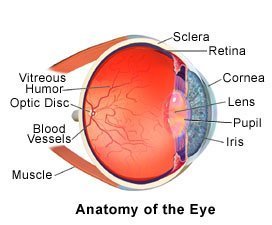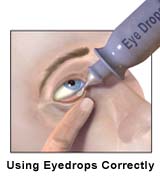The originating document has been archived. We cannot confirm the completeness, accuracy, or currency of the content.
Scleral Buckling
Medically reviewed by Drugs.com. Last updated on Feb 20, 2025.
WHAT YOU SHOULD KNOW:
- Scleral buckling is surgery to fix a detached retina. The retina is a thin layer of cells on the back of your eyeball. Your retina sends the images that you see from your eyes to your brain. A detached retina means that your retina has torn away from the tissue behind it. Your retina may become detached if it gets a hole in it and fluid builds up behind it. A detached retina also may be caused by inflammation (swelling) or an injury to your eye. A detached retina makes your vision worse, and you may lose sight in your eye.

- During surgery, your caregiver reattaches your retina and stitches a small buckle onto your sclera (the white part of your eye). Scleral buckling surgery may help keep your eyesight from becoming worse. It also may decrease the risk of your retina detaching a second time. With scleral buckling, your eyesight may become clearer and it may be easier to do your daily activities.
INSTRUCTIONS:
Take your medicine as directed:
Call your primary healthcare provider if you think your medicine is not helping or if you have side effects. Tell him if you are allergic to any medicine. Keep a list of the medicines, vitamins, and herbs you take. Include the amounts, and when and why you take them. Bring the list or the pill bottles to follow-up visits. Carry your medicine list with you in case of an emergency.
- Eye drops: Ask your caregiver for information about putting drops into your eye. You may need one or more of the following eye medicines:
- Antibiotics: This medicine is given to fight or prevent an infection caused by bacteria. Always take your antibiotics exactly as ordered by your primary healthcare provider. Do not stop taking your medicine unless directed by your primary healthcare provider. Never save antibiotics or take leftover antibiotics that were given to you for another illness.
- Steroids: This medicine may be given to decrease inflammation.
- Pain medicine: You may be given medicine to take at home as eye drops or pills to help decrease pain. Your caregiver will tell you how much to take and how often to take it. Take the medicine exactly as directed by your caregiver. Do not wait until the pain is too bad before taking your medicine. The medicine may not work as well at controlling your pain if you wait too long to take it. Tell caregivers if the pain medicine does not help, or if your pain comes back too soon.

Ask for information about where and when to go for follow-up visits:
For continuing care, treatments, or home services, ask for more information.
- Tell your caregiver if you have any new symptoms, such as new problems seeing. Your caregiver will check how your eye is healing and if your retina has detached again.
Eye care:
Ask your caregiver for instructions about taking care of your eye after surgery. If you still have decreased vision after surgery, your caregiver may want you to see a vision rehabilitation therapist. This caregiver will teach you how to use tools that help you see better.
Activity:
Ask your caregiver if you should avoid driving and air travel. Do not drive or travel by air until your caregiver says it is okay.
CONTACT A CAREGIVER IF:
- You have a fever.
- You have discharge (pus) leaking from your eye.
- You feel sick to your stomach and have a headache.
- You have new problems seeing, such as blurry vision.
- You have questions about your medicine or care.
SEEK CARE IMMEDIATELY IF:
- You have a seizure (convulsion).
- You have severe (very bad) eye pain.
- You have trouble breathing.
- You see new flashes of light in front of your eyes.
- You see new lines floating in front of your eyes.
- You see what looks like a dark curtain or shadow in front of your eyes.
- Your eyeball or eyelid is swollen.
- Your eye is bleeding.
- Your field of vision suddenly narrows (tunnel vision).
The above information is an educational aid only. It is not intended as medical advice for individual conditions or treatments. Talk to your doctor, nurse or pharmacist before following any medical regimen to see if it is safe and effective for you.
Further information
Always consult your healthcare provider to ensure the information displayed on this page applies to your personal circumstances.
Copyright © 2012. Thomson Reuters. All rights reserved. Information is for End User's use only and may not be sold, redistributed or otherwise used for commercial purposes.
